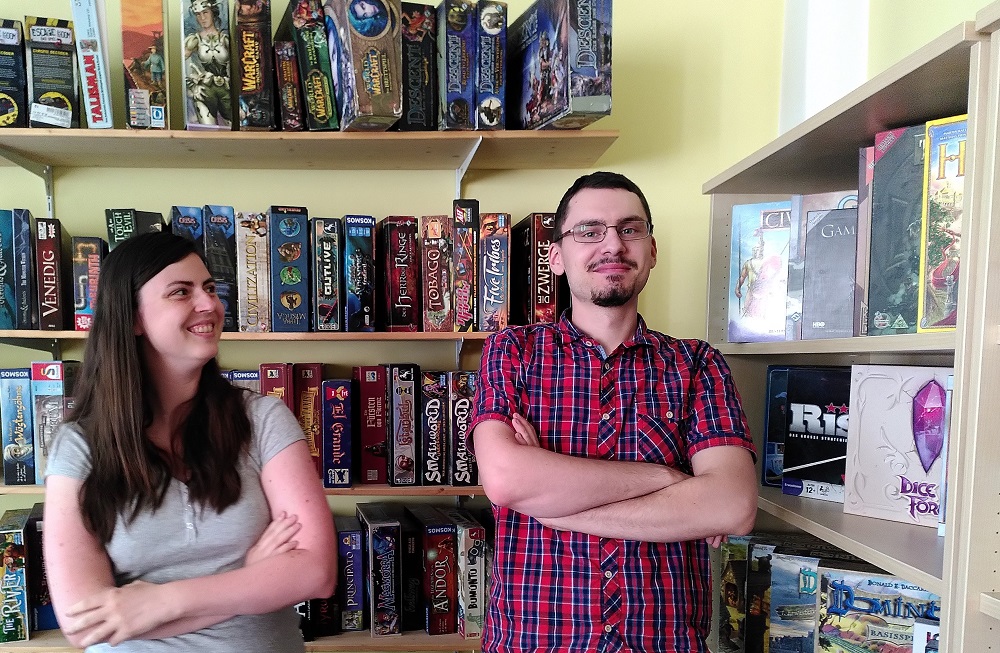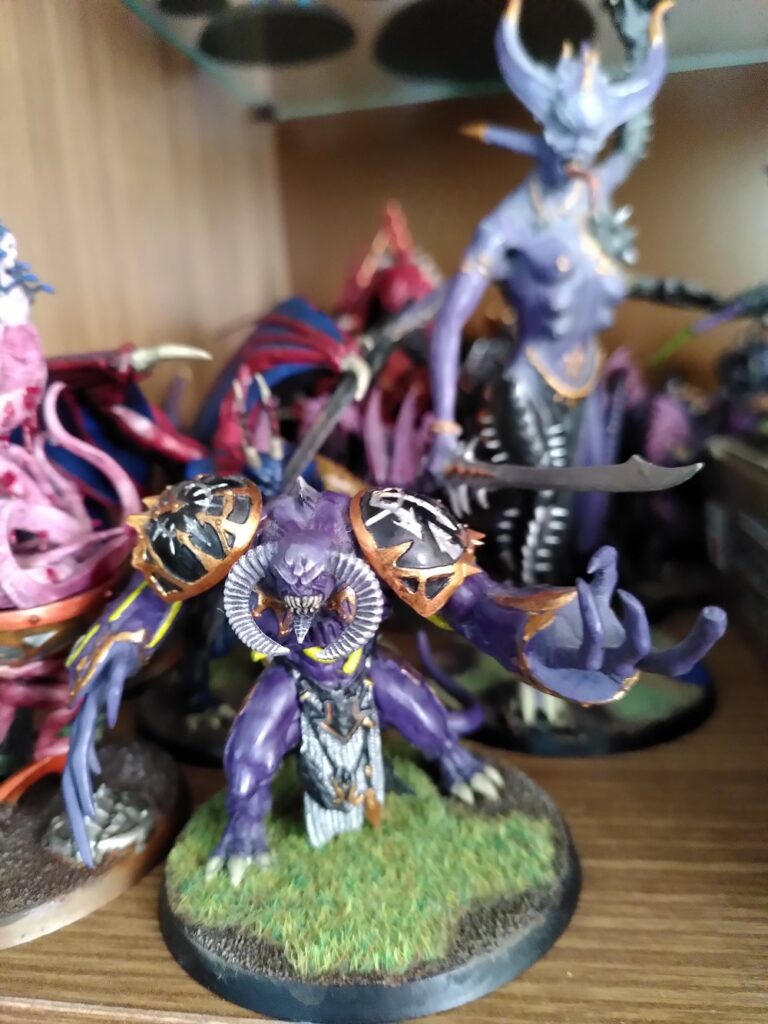Almost every household has access to a virtually infinite number of games. PC, console or mobile – no matter the platform: it has never been easier to find entertainment. Nevertheless, “playing without a screen”, completely without the help of digital augmentations, has its own charm which has its place even in the digital age.
The Würfelpech e.V. in Halle is a gathering place for fans of analogue games and offers them the opportunity to immerse into their hobby. I am with four of the club’s members, Teresa, Joshua, Marvin and Michael, talking about their experiences at the gaming table. Behind them flaunts a bookshelf bulgingly filled with rule and source books. In the room next door miniatures for the next Warhammer tournament are meticulously painted.
Boardgames, Roleplay and Tabletop
Those only thinking about Uno, Monopoly and Ludo in the context of analogue games have a lot to catch up on. The gaming scene is as diverse as its fans and new games are joining the market constantly – developed by popular publishers as well as crowdfunded indie companies.

Boardgames may be the most accessible variety to play analogue. You buy a box including all necessary parts, read the rules that leave little room for interpretation and follow the more or less strict path until you reach the determined end. Varied mechanics and beautiful illustrations offer a comparatively easy gaming experience. However, the accessibility of boardgames in terms of their clear rules and goals restricts their flexibility considerably.
A roleplaying game on the other hand is designed for personal character development as Teresa, self-proclaimed “Mother of the ‘Würfelpech e.V.’” and roleplaying enthusiast for years, says. Roleplaying games come with a set of rules too, of course. However, those generally only specify how the success or failure of an action is determined and not which actions can be performed in the first place. Even with this freedom there is often room for interpretation.
In a roleplaying game you are either a player or the dungeon master. As a player you create your personal character with characteristics and abilities, give them depth by constructing their background story and personality. As your character you experience the stories the game leads you into. The dungeon master’s responsibility is to guide through the story, describe the setting and impersonate all side characters. Roleplaying therefore requires the will to improvise, empathize with your character and, particularly important, listen to your fellow players. Most roleplaying games also offer the possibility to create your own adventures. As the players do not know the story beforehand, they rarely choose the intended path – in that case the dungeon master must cope with that and continue in this new direction. What can be overwhelming at first often reveals unexpected talents.
Tabletop games zoom out of the roleplay. You are rather a “commander, building your army and leading it into battle”, as described by Marvin Gröning, founding member of the Würfelpech e.V. and tabletop enthusiast. While roleplaying games are usually played cooperatively against the dungeon master or the story itself, tabletop games are competitive. You either win or you lose. However, the game is more than the battle itself, building your army is its own process. Every miniature is put together from torso, arms, legs and head and painted to one’s own taste. Even though this presents a financial and temporal barrier, it could satisfy one’s creativity and collector’s passion. “My focus is a pretty collection of miniatures rather than winning, but of course this is a nice feeling of success as well”, says the club member Michael Teuchler.
Tabletop games focus on strategy: The composition of your troops, their positioning on the game table, taking the environment into account… and moreover you must consider what your opponent does with all their options as well. But even with the best strategy and army, luck with the dice may just not be with you. In the end, the dice decide whether the sword hits, the hero faints or the negotiation could push the merchant’s prices. They make the game a bit more unpredictable and a certain amount of luck necessary.
Where the Fun Ends
Especially in the tabletop and roleplay section the stereotype of the socially awkward “typical nerd” still persists. When they started out, pen & paper games, especially in the conservative USA, were often associated with satanism and thus banished to small parties, meeting secretly in the basement.
Even though the Würfelpech e.V. claims to be “unpolitical and colourful”, and everyone is welcomed equally, the current members are predominantly male. According to club member Marvin Gröning this is the common scene throughout the entire community, be it other associations or private groups.
The miniatures building your army are almost exclusively male. Women can only be found rarely, in certain factions or as oversexualized demons. That appeals mainly to men; after all, you want to be able to identify with your troops, which creates a cycle: Products oriented toward men lead to a male dominated community, which motivates publishers to release products for this target group.
Nevertheless, there is some progress in the scene. Pop culture has pulled the hobby out of the stereotypical nerd corner and into the mainstream. The highly successful Netflix series Stranger Things for example begins with the protagonists playing the roleplaying game Dungeons and Dragons. Social networks and the internet in general offer a platform that could open the sworn in coven of players and give newcomers an easy entry point. Those not willing to play right away themselves may only watch a livestream of other players first. The channel “Critical Role”, where a group of voice actors livestreams their Dungeons & Dragons sessions, was the most successful channel on the platform Twitch in 2021.
Like that, the demographics in the pen and paper community are slowly becoming more heterogeneous, which fits the impressions of the Würfelpech e.V. – especially in the roleplaying area the share of women has improved. Eventually, this development reaches the publishers who diversified their portfolio in the recent past. Card games as Magic: The Gathering rework their previously unrealistically oversexualized illustrations. That may not please every veteran player, but this “we have always done it this way” mentality is kept by a dying minority.
Cultural differences split the community additionally. The German tabletop scene is quite strategic and competitive, according to Marvin Gröning and Joshua Scherf from the Würfelpech e.V.. The frustration after a defeat is much higher compared to a British party for example. The term “German Games” refers to planned out and complex games for a reason. Contrasting are the so called “Beer and Pretzels Games”, characterised by an easy entry and a lot of randomness; the level of focus necessary may not be too high, so you can have a beer and some snacks, besides a nice chat.
Between the game and reality

The fun playing gets easily lost if the players forget where the game ends. That does not only apply to sore losers who want to blame their dice’s bad result on their opponent, but also to those who take the games’ setting too serious.
In games set in real-world-scenarios like World War II the lines are comparatively clear. Many rule systems do not encourage playing the bad guys yourself. That role is mostly reserved for the antagonists which are supposed to be defeated in the adventure. Fantasy or sci-fi settings are harder to assess. To what extent do they reference the real world’s events? Is the fascist space-emperor a Nazi or just a generic antagonist and the game completely disconnected from reality? In The dark Eye, the most successful German roleplaying game, elves are a key part of the world. In the rulebook they are generally depicted as simple minded. What sounds like a fantasy spin on racism is explained with the differences in human and elven culture being so huge, most conversations aim at completely cross purposes, thus from a human perspective they appear uneducated. How this discrepancy is played out depends on the player.
Nevertheless, judging a player for the fraction or character of their choice would be wrong. “In the end it’s just a game. We play war, but we don’t have to behave like we’re actually doing it”, Marvin Gröning summarizes. He says only those taking everything too seriously ruin the experience for themselves and the other players.
Bottom line
Playing away from any screen is incredibly multifaceted. Some games have always been commonplace at the family table, others have long been relegated to a fringe group phenomenon. As sad as that is, it is all the nicer to see the stigmatization fall apart. This is helping the game get a larger audience and the players’ community become more diverse, which in turn affects the representation by the publishers.
Pen & paper games are often an important part of their followers’ leisure time and a wonderful way to express themselves; no matter if they are the dungeon master creating new worlds and stories, a player engaging in their created character or someone submerging themselves into roleplay giving life to the game.
All doors are open to those interested and associations like the Würfelpech e.V. welcome every newcomer with open arms. Even if it may take some effort in the beginning to get involved in the experience and there are certainly many people for whom it is not the right thing in the end, there is hardly anything to lose if you dare to roll the dice yourself.
Translation: Stefan Kranz
